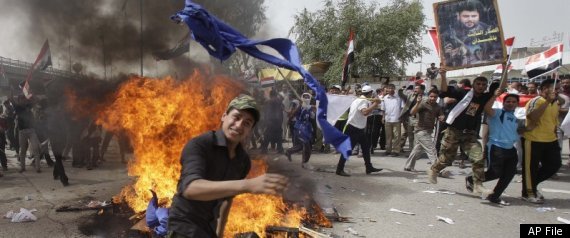 Pfc. Tasha Conger and Pfc. Tanya Redinbaugh hope their service will seem typical someday. For now, they’re part of a tiny minority of female soldiers living at front-line combat positions.
Pfc. Tasha Conger and Pfc. Tanya Redinbaugh hope their service will seem typical someday. For now, they’re part of a tiny minority of female soldiers living at front-line combat positions.
That could change if a national commission gets its way. The commission told Congress last month that if a woman can show she’s qualified, she ought to be allowed to take any military job.





 The sputtering end of the Obama administration’s plans to prosecute Khalid Sheik Mohammed in federal court came one day late last month in a conversation between the president and one of his top Cabinet members.
The sputtering end of the Obama administration’s plans to prosecute Khalid Sheik Mohammed in federal court came one day late last month in a conversation between the president and one of his top Cabinet members. Nearly eight years after it was first erected, the controversial wall snaking through verdant fields and dusty hillsides has become a permanent fixture of the landscape. It has also cemented a psychological divide between Israelis and Palestinians, undermining the prospects for lasting peace that could not only end hostilities but boost economic prosperity.
Nearly eight years after it was first erected, the controversial wall snaking through verdant fields and dusty hillsides has become a permanent fixture of the landscape. It has also cemented a psychological divide between Israelis and Palestinians, undermining the prospects for lasting peace that could not only end hostilities but boost economic prosperity. The fact that we're debating the social benefits of child labor laws in the second decade of the 21st century casts the madness that's gripped our right-wing in sharp relief. It took a hard-fought, century-long battle to get compliant kids working for slave-wages out of American workplaces, and that battle was supposedly won 73 years ago during the New Deal.
The fact that we're debating the social benefits of child labor laws in the second decade of the 21st century casts the madness that's gripped our right-wing in sharp relief. It took a hard-fought, century-long battle to get compliant kids working for slave-wages out of American workplaces, and that battle was supposedly won 73 years ago during the New Deal. Lost in the renewed scrutiny into President Barack Obama’s birth records is the fact that anyone can walk into a Hawaii vital records office, wait in line behind couples getting marriage licenses and open a baby-blue government binder containing basic information about his birth.
Lost in the renewed scrutiny into President Barack Obama’s birth records is the fact that anyone can walk into a Hawaii vital records office, wait in line behind couples getting marriage licenses and open a baby-blue government binder containing basic information about his birth. The U.S. military says two American soldiers have been killed while conducting operations in southern Iraq. In a statement, released on Saturday, the military says the deaths occurred Friday.
The U.S. military says two American soldiers have been killed while conducting operations in southern Iraq. In a statement, released on Saturday, the military says the deaths occurred Friday. Veterans whose claims had already spent years in the VA system often wait several more years for the court to rule on whether they will receive disability payments and free health care. Some have abandoned their appeals. Others, including soldiers from as far back as World War II, have died before a decision was issued.
Veterans whose claims had already spent years in the VA system often wait several more years for the court to rule on whether they will receive disability payments and free health care. Some have abandoned their appeals. Others, including soldiers from as far back as World War II, have died before a decision was issued. Former chief U.N. nuclear inspector Mohamed ElBaradei suggests in a new memoir that Bush administration officials should face international criminal investigation for the "shame of a needless war" in Iraq.
Former chief U.N. nuclear inspector Mohamed ElBaradei suggests in a new memoir that Bush administration officials should face international criminal investigation for the "shame of a needless war" in Iraq. Smokers may soon have no safe havens to light up outside their own homes. That's the hope, at least, among anti-tobacco crusaders at the
Smokers may soon have no safe havens to light up outside their own homes. That's the hope, at least, among anti-tobacco crusaders at the 






























